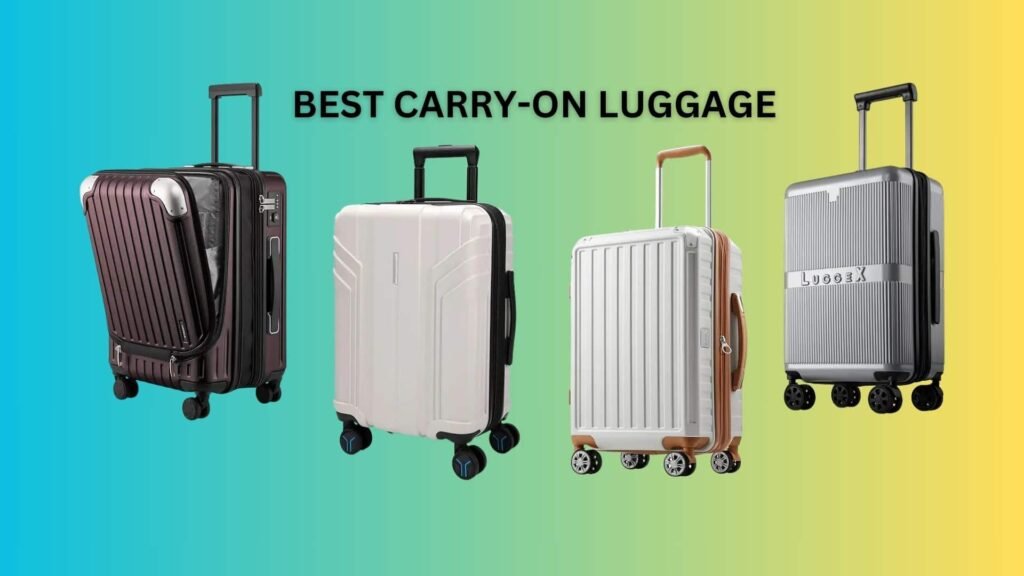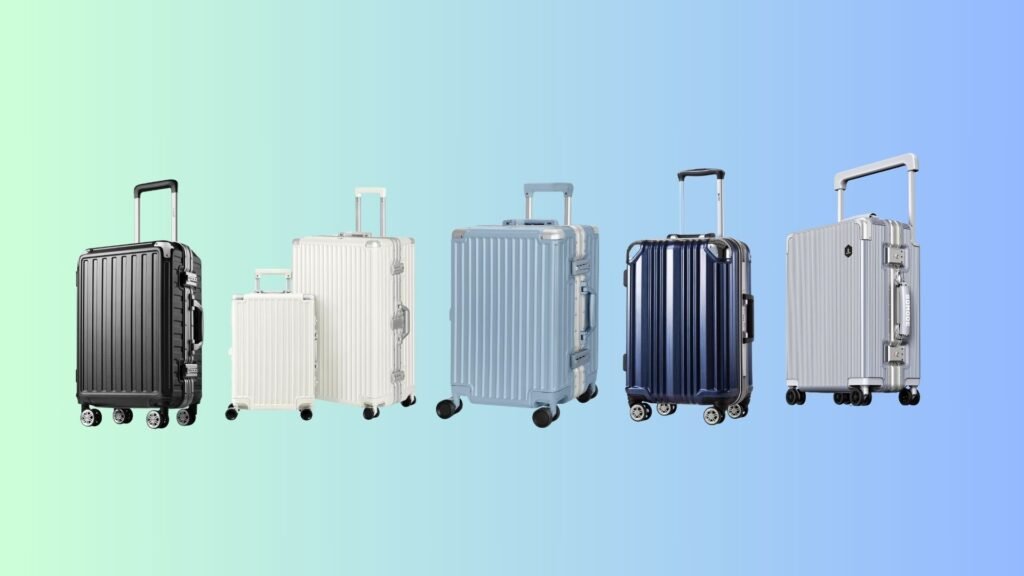Best Camera Vlogging Choosing the right camera for vlogging is critical for content creators, influencers, and YouTubers seeking high-resolution video, reliable autofocus, and portability. Vlogging cameras deliver 4K video, flip-out screens, and vlog-specific features to elevate content creation. Our top picks—Sony ZV-1 II (Best Overall), Canon PowerShot G7 X Mark III (Best Compact), Sony A7C II (Best Mirrorless), Panasonic Lumix S9 (Best Full-Frame), and GoPro Hero 13 Black (Best Action)—cater to beginners and professionals with prices from $400–$2,000.
Key factors include 4K/60fps resolution, fast eye-tracking autofocus, audio inputs, and compact designs. These cameras suit travel, lifestyle, or cinematic vlogging, ensuring professional results.
ALSO READ: Best Medium Checked Luggage
Why Choose a Camera for Vlogging?
Benefits of Vlogging Cameras
Dedicated vlogging cameras outperform smartphones with superior 4K video, enhanced low-light performance, and external microphone support, per TechRadar. They’re ideal for travel vlogs, YouTube tutorials, TikTok content, or professional video production.
Features like flip-out/tilting screens, fast autofocus (eye-tracking), in-body/lens stabilization, and audio inputs (3.5mm, hot shoe) ensure ease and quality, per PCMag. At $400–$2,000, these cameras offer durability and professional-grade results, reducing the need for frequent smartphone upgrades, per Digital Camera World.
Top 5 Best Camera Vlogging
Below are five top vlogging cameras, compared by resolution, autofocus, weight, price ($400–$2,000), and suitability for vlogging needs.
1. Sony ZV-1 II – Best Overall
- Ultra-wide 18-50mm1 zoom lens gets it all in the frame
- Large 1.0-type sensor for professional results even in low-light
- Wide aperture F1.8-4.0 lens for beautifully defocused backgrounds
- Features: 4K/30fps, 20MP, 18–50mm f/1.8–4 lens, flip-out screen, eye-tracking AF, 290g.
- Pros: Compact, vlog-specific modes (Background Defocus), built-in high-quality mic, per PCMag.
- Cons: No 4K/60fps, limited zoom range, per Digital Camera World.
- Best For: Beginner to intermediate vloggers needing portability and ease of use.
2. Canon PowerShot G7 X Mark III – Best Compact
- NB-13L Lithium-Ion Battery Pack (3.6V, 1250mAh)
- Features: 4K/30fps, 20MP, 24–100mm f/1.8–2.8 lens, flip-up screen, fast AF, 304g.
- Pros: Pocketable, excellent low-light performance, live streaming support, per TechRadar.
- Cons: No hot shoe, battery life limited (235 shots), per CNET.
- Best For: Travel vloggers needing a lightweight, versatile camera.
3. Sony A7C II – Best Mirrorless
- Incredibly compact and lightweight, packed with full-frame performance
- 33.0MP full-frame Exmor R CMOS sensor
- BIONZ XR processing power for exceptional image quality
- Features: 4K/60fps, 33MP full-frame, flip-out screen, AI-based eye-tracking AF, 514g.
- Pros: Pro-grade video, interchangeable lenses, superior low-light, per Digital Camera World.
- Cons: Expensive, larger than compacts, per PCMag.
- Best For: Advanced vloggers seeking cinematic quality and lens flexibility.
4. Panasonic Lumix S9 – Best Full-Frame
- Ultra-Fast Connection and Transfer: Transfer content to your smartphone seamlessly with LUMIX Lab and an ultra-fast Wi-F…
- Think Big, Pack Small: Compact camera packed with professional-grade features; the perfect everyday companion to capture…
- High Image Quality: With its full-frame sensor, LUMIX S9 delivers stunning results even in low-light conditions, for hig…

- Features: 4K/60fps, 24MP full-frame, flip-out screen, phase-detect AF, 403g.
- Pros: Compact full-frame, open-gate recording, LUT support for creative grading, per CNET.
- Cons: Pricey, shorter battery life (270 shots), per DPReview.
- Best For: Vloggers needing full-frame quality in a compact body.
5. GoPro Hero 13 Black – Best Action
- Best-in-class 5.3K60 video and legendary durability combine with new HB-Series Lenses1 and a more powerful battery to ma…

- Features: 5.3K/60fps, 27MP, 155° FOV, HyperSmooth 6.0 stabilization, waterproof, 121g.
- Pros: Ultra-portable, rugged, excellent stabilization for dynamic shots, per DPReview.
- Cons: No flip screen, fixed lens, per TechRadar.
- Best For: Adventure vloggers needing durability and wide-angle footage.
How We Chose the Best Cameras for Vlogging
Criteria for Selecting Top Vlogging Cameras
We evaluated cameras based on:
- Video Quality: 4K/30fps–60fps, 20–33MP photos, strong low-light performance, per TechRadar.
- Autofocus: Fast eye-tracking and face detection for dynamic vlogging, per PCMag.
- Portability: Lightweight (<600g), compact designs for mobility, per Digital Camera World.
- Features: Flip-out screens, 3.5mm mic inputs, stabilization (IBIS/lens-based), per CNET.
- User Feedback: 4.2–4.8/5 ratings from Amazon, B&H Photo, Reddit (r/videography), X posts (@VloggingGear).
- Price-to-Value: Balances cost ($400–$2,000) with features, per DPReview.
Quick Comparison of Best Cameras for Vlogging
| Model | Price | Resolution | Weight | Key Features | Best Use |
| Sony ZV-1 II | ~$$$ | 4K/30fps | 290g | Flip-Out Screen, Background Defocus | Beginners |
| Canon G7 X Mark III | ~$$$ | 4K/30fps | 304g | Flip-Up Screen, Live Streaming | Travel Vloggers |
| Sony A7C II | ~$$$ | 4K/60fps | 514g | Full-Frame, AI Autofocus | Professionals |
| Panasonic Lumix S9 | ~$$$ | 4K/60fps | 403g | Full-Frame, Open-Gate Recording | Full-Frame Vloggers |
| GoPro Hero 13 Black | ~$$$ | 5.3K/60fps | 121g | HyperSmooth 6.0, Waterproof | Action Vloggers |
Benefits of Vlogging Cameras
Why Choose a Dedicated Camera for Vlogging?
Vlogging cameras offer:
- Superior Video: 4K/60fps and high-resolution sensors for crisp footage, per TechRadar.
- Reliable Autofocus: Eye-tracking keeps subjects sharp during movement, per PCMag.
- Professional Audio: 3.5mm mic inputs and hot shoes for clear sound, per CNET.
- Versatility: Flip-out screens and stabilization for easy, smooth vlogging, per Digital Camera World.
What Users Say About These Vlogging Cameras
Feedback from Amazon, B&H Photo, Reddit (r/videography), and X posts (@VloggingGear):
- Sony ZV-1 II: “Perfect vlogging setup, great built-in audio,” 4.7/5, per PCMag.
- Canon G7 X Mark III: “Compact, ideal for travel vlogs,” 4.5/5, per TechRadar.
- Sony A7C II: “Cinematic quality, sharp focus in low light,” 4.6/5, per Digital Camera World.
- Panasonic Lumix S9: “Lightweight, pro-grade video with LUTs,” 4.4/5, per CNET.
- GoPro Hero 13 Black: “Rugged, amazing for action vlogs,” 4.8/5, per DPReview.
Concerns include price (Sony A7C II, Lumix S9), battery life (Canon G7 X), and fixed lens/no flip screen (GoPro), per Reddit (r/videography).
Maximize Your Vlogging Camera
Tips for Optimizing Your Vlogging Camera Setup
Maximize performance with these tips, per TechRadar and PCMag:
- Sony ZV-1 II: Use Background Defocus mode for creamy bokeh; attach a Rode VideoMicro for enhanced audio.
- Canon G7 X Mark III: Pair with a mini tripod (Joby GorillaPod) for stable handheld shots.
- Sony A7C II: Customize AF settings for fast-moving subjects; use a 24–50mm lens for versatility.
- Panasonic Lumix S9: Shoot in open-gate mode for flexible cropping in post-production.
- GoPro Hero 13 Black: Attach to a chest mount for immersive POV vlogs; use HyperSmooth 6.0 for smooth action shots.
- Accessories: Invest in external mics (Rode VideoMicro, $60), tripods, and extra batteries, per Digital Camera World.
Conclusion
The Sony ZV-1 II excels for beginner-friendly vlogging, Canon PowerShot G7 X Mark III for compact travel needs, Sony A7C II for pro-grade mirrorless performance, Panasonic Lumix S9 for full-frame quality, and GoPro Hero 13 Black for action-packed vlogs. Match your camera to your vlogging style, budget, and portability needs to create standout content. Shop now on Amazon, B&H Photo, or Sony to start vlogging!









